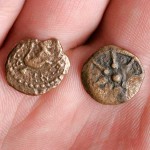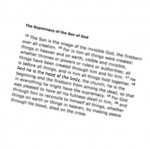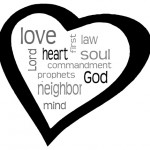A modern widow’s mite?
Jesus praised a widow who put her last pennies into a collection that would be used to care for the poor.
He praised her. She had no way to care for herself, and he praised her.
He didn’t praise the people who put in hundreds and thousands of dollars. He praised the widow who gave pennies and could no longer care for herself.
Don’t believe me? It’s right here:
And he sat down opposite the treasury and watched the people putting money into the offering box. Many rich people put in large sums. And a poor widow came and put in two small copper coins, which make a penny. And he called his disciples to him and said to them, “Truly, I say to you, this poor widow has put in more than all those who are contributing to the offering box. For they all contributed out of their abundance, but she out of her poverty has put in everything she had, all she had to live on.” (Mark 12:41-44 ESV)
Notice that Jesus praised the widow because she gave “everything she had, all she had to live on.”
Now, Sol at “Looking for Church” has brought this passage into the present with his post “What did I Give.”
Sol writes:
I know a man who has almost no money, no retirement, no savings account, and no ability to work to gain money. I don’t want to get into how I was able to help this man, but it involved buying him something. As I was leaving his apartment, he wanted to pay back part of the money now, and the rest in two weeks.
As he insisted, I told him to give the money to someone who needs it, and he then told me that he does that. What!?! I thought. You already do?
This man, knowing that he has no money, knowing he is about to part with his savings, and would need to save more to pay the rest in two weeks, was already doing it!?!
He told me that just yesterday, already knowing he needed to pay this money, while he was out getting some food, saw a homeless man and bought him lunch.
Wait… I thought Jesus’ statements (like in the passage above) were hyperbole? You mean we are actually supposed to give to people even when it means we do without?
Implications of the Headship of Christ
Josh at “Called to Rebuild” as written an excellent article called “Christ the Key Ingredient.”
He begins with what he says stands out above everything else: “The absolute centrality and supremacy of Jesus Christ as Head over all things.”
Beginning with the headship of Christ, Josh steps through several implications, including love for, fellowship with, and unity with other followers of Jesus.
Concerning that unity, Josh writes:
Once I began to know this kind of unity I knew I could no longer denominate myself from other believers. I became convinced that this experience-this bond of life and fellowship-was the answer to all our questions and all our seeking. So I became hungry for more. And eventually I realized that to know this kind of fellowship on a daily basis-which is what the New Testament envisions-I was gonna have to live close enough to my brothers and sisters that we could see each other as regularly as we wanted. No more driving to “church†thirty minutes away, having a couple hours of fellowship (if I was lucky), then having to return home and try my best to survive the rest of the week all alone as a Christian. No. I would spend all my moments within the community of the redeemed, for this is where the Christian life is meant to be lived.
When we began to consider the implications of the headship of Christ – along with his presence – we truly begin to see the church and others in a different light.
What has changed in the way you view other believers because of the headship and authority of Jesus Christ?
Examiner.com article: Food banks provide more than food
My first Examiner.com article is posted here: Food banks provide more than food.
I’m writing as the “Raleigh Practical Christianity Examiner,” so my goal is to help Jesus’ followers to live out what they say that they believe.
My article begins like this:
Jesus told his disciples that they should be recognized both for their love for one another and for their care for “the least,” that is, for those who are hungry, sick, imprisoned, or homeless. In today’s struggling economy, more and more people find themselves among those needing help.
Since this is a new medium for me, I would appreciate any feedback.
A Day I Saw Jesus
This post is part of the January 2011 synchroblog on the topic “The Manifestation of God.” Now, when I first read about this synchroblog – and the fact that it would fall around the celebration of the Ephiphany – I again thought about not participating.
As most of my readers know, I did not grow up in a liturgical tradition. I mean, obviously, we had our “liturgy,” but it didn’t follow the traditional Christian calendar.
Then, I thought more about the description of this synchroblog topic:
This month’s synchroblog’s theme is inspired by the season of Epiphany which begins on January 6 and ends the day before Ash Wednesday. The word “epiphany” is rich in meaning. Epiphany is derived from the Greek epiphaneia and means manifestation, shining forth, revelation, or appearance. In a religious context, the term describes the appearance of an invisible divine being in a visible form. It can also indicate a sudden realization or comprehension of the (larger) essence or meaning of something. An “epiphany” might refer to those times in life when something becomes manifest, a deep realization, a sudden recognition that changes one’s view of themselves or their social condition and often sparks a reversal or change of heart. In the spirit of Epiphany we invite you to share stories, experiences and/or thoughts about “The Manifestation of God.”
I realized that while I did not celebrate “the season of Ephiphany” annually, the idea of epiphany is central to my understanding of who I am in Jesus Christ.
In fact, it all goes back to Jesus’ statement to Peter upon Peter’s confession that Jesus was “the Christ, the Son of the living God.” Jesus said, “Blessed are you, Simon Bar-Jonah! For flesh and blood has not revealed this to you, but my Father who is in heaven.” (Matthew 16:17 ESV)
I believe that all who are God’s children have such an “epiphany” – that is, such a revelation from God that Jesus is the Christ, the Son of God, and that we have salvation, a place in God’s kingdom, and a restored relationship with God through him.
So, I began to ask myself, when have I seen Jesus Christ revealed? Immediately, so many examples popped into my mind. But one episode stood out clearest. So, I decided to share about this one particular day that I saw Jesus revealed.
Rhonna was a friend of ours. We had met her several months before in “the Neighborhood” – a government assisted housing project in our city. She was a single mother with four children who was both working and going to school to try to make a better life for herself and her family. Over those months, Rhonna had begun to share part of her story with my wife, Margaret. She had had a rough past.
Once, when we were out of town, Rhonna called us. She had gotten into some legal trouble when she tried to break up a fight. Now, because of the legal trouble, she was being kicked out of her duplex.
After several weeks of trying to get the decision reversed, the government organization gave Rhonna and her family an eviction notice. She had to move out; there was not further recourse available.
We told some of our friends about Rhonna and her situation. She had to move out of her duplex, and she had to move right away. Could anyone help?
Several of our friends showed up at Rhonna’s duplex with a couple of trucks and willing hearts. Together, we loaded the family’s belongings into the trucks and a few cars and made several trips to a local storage facility. Rhonna had decided to store her belongings and move in with her mother in a nearby city.
That night, I saw Jesus several times. I saw Jesus in the humility of a single mother who was willing to ask for and accept help – even from strangers. I saw Jesus when Rhonna began to weep and share with my wife about her struggles and her past experiences with domestic abuse. I saw Jesus in the faces of my friends who were willing to give up their evening for a complete stranger who could never repay their kindness.
I saw Jesus that night so many times and in so many ways. As our lives intertwined with his, I knew that our Father in heaven was revealing something special to us. That night, the kingdom of heaven was close.
You see, it’s very possible for God to reveal himself to us in the form of dreams or visions. But, God is present with his children every moment of every day. We should look for and expect to see “revelations” from God when his children are following him.
——————————————————
Here is a list of other posts that are part of the January 2011 synchroblog “The Manifestation of God“:
Beth Patterson – A Robust Universe Includes The Botched and Bungled
Jeff Goins – The Manifestation Of God
Jeremy Myers – Pagan Prophecies Of Christ
Mark Smith – Manifestation Of God
Ellen Haroutunian – Stories of Epiphany
Liz Dyer – God Breaking Through Moments
Josh Morgan – The Manifestation Of God
Steve Hayes – Theophany: the manifestation of God
Sarah Bessey – In which Annie opens the door of her heart
Christine Sine – Eve of Epiphany – We Have Come, We Have Seen, Now We Must Follow
Tammy Carter – Paralysis In His Presence
Peter Walker – Epiphany Outside Theophany (Outside Christianity)
Community or Mission?
There is a natural assumption that building community decreases missional activity or that increasing missional activity decreases the prospects of community.
In Christ, our fellowship with one another must include both community with one another and common acts of service, love, and mercy toward others. Without both mission to others and fellowship with one another, we do not actually have community in Christ.
Fellowship with one another in Christ leads to mission. Missional activities with one another in Christ builds community. The two (community and mission) go together.
The church is both gathered by God (into community) and sent by God (into the world). We can’t have one without the other and still be God’s people in Christ.
So, what should a group of believers do if they realize that they are focusing all (or most) of their energies, resources, and times on themselves and are not reaching out to others? What should a group of Jesus’ disciples do if they realize that they are reaching out to others, but they are not building community among themselves?
Another Example of Serving
As you know, I often write about how I (or my family or friends) serve others. For the latest example, see my previous post “More Than Meals.”
I’ve taken some heat for this before. Occasionally, someone will point out that Jesus said, “Beware of practicing your righteousness before other people in order to be seen by them, for then you will have no reward from your Father who is in heaven.” (Matthew 6:1 ESV) First of all, I think that Jesus was talking about serving with a motivation of being seen by others. In other words, I’ll do this so that other people will see me serving and then they’ll think better of me (or whatever).
We must remember that Jesus also said, “In the same way, let your light shine before others, so that they may see your good works and give glory to your Father who is in heaven.” (Matthew 5:16 ESV) So, while we must always check our motivation, we should also be willing to serve openly in a way that will urge others to glorify God.
I think we need to see more and more examples of serving. We need to see these as examples to follow and examples that will encourage, challenge, even admonish us toward demonstrating love and good works.
For this reason, I’m glad that Lionel at “A View of the Woods” has shared an example of how he has been serving the elderly in his community for the past year in a post called “What You Do To The Least of These: Lend A Helping Hand.” (Apparently Lionel likes long post titles, too.)
I hope you read Lionel’s post and look at the pictures that he has posted. If you are not involved in serving “the least” (particularly those who cannot serve or love you back), then I hope that Lionel’s example is an encouragement and admonishment for you. Why? Because if you are following Jesus then you will be caring for “the least.”
If you are involved in serving the least, then use Lionel’s example as an opportunity to praise God for working through another one of his children to show his love to the world!
The Christians support not only their own poor, but ours as well
While I was doing some research, I ran across this quote from Julian (the Apostate). (I’ve published the quote before, but decided to do so again.) History (primarily Christian history) has given Julian the name “the Apostate” because he attempted to move the Roman Empire back toward paganism after Constantine.
What alot of people may not know is that the Roman emperors following Constantine fluctuated between Christianity (of differing forms) and paganism. Julian was one of those who wanted the empire to return to the pagan religions of Rome’s past and thus remove the curses of the gods and return to their favor.
Anyway, at one point, Julian complained about the Christians (“Galileans”). I thought you might like to read his complaint:
Why do we not observe that it is their [the Christians’] benevolence to strangers, their care for the graves of the dead, and the pretended holiness of their lives that have done most to increase atheism [unbelief of the pagan gods]?… For it is disgraceful that, when no Jew ever has to beg, and the impious Galileans [Christians] support not only their own poor but ours as well, all men see that our people lack aid from us. Teach those of the Hellenic faith to contribute to public service of this sort.
It is too bad that most Christians have since given up caring for their own poor, much less caring for poor unbelievers. Perhaps more would have this same complaint if we turned back to “the Way” taught by Jesus.
But, hey, at least we have better doctrine now.
The Great Commandment in the OT: Love Others
So, far, as we’ve looked at Jesus great commandment to love God and love your neighbor, I’ve concluded that Jesus definitely could have found the “Love God” part as a focus of the Old Testament. (See my posts “The Great Commandment in the OT: Preview” and “The Great Commandment in the OT: Love God.”)
But, Jesus was clear in Matthew 22:37-40 that “all the Law and the Prophets” depends upon both the command to love God and the command to love your neighbor as yourself.
So, where did Jesus get the part about loving your neighbor? Is it as clear as the “love God” portion of the command?
To begin with, we do find that Jesus quoted the second half of a sentence from Leviticus:
You shall not take vengeance or bear a grudge against the sons of your own people, but you shall love your neighbor as yourself: I am the Lord. (Leviticus 19:18 ESV)
In fact, the sentence above closes out a section of Leviticus that specifically deals with neighborly relations:
You shall not oppress your neighbor or rob him. The wages of a hired servant shall not remain with you all night until the morning. You shall not curse the deaf or put a stumbling block before the blind, but you shall fear your God: I am the Lord. You shall do no injustice in court. You shall not be partial to the poor or defer to the great, but in righteousness shall you judge your neighbor. You shall not go around as a slanderer among your people, and you shall not stand up against the life of your neighbor: I am the Lord. You shall not hate your brother in your heart, but you shall reason frankly with your neighbor, lest you incur sin because of him. You shall not take vengeance or bear a grudge against the sons of your own people, but you shall love your neighbor as yourself: I am the Lord. (Leviticus 19:13-18 ESV)
While this is a lengthy passage, we do not find the same prolific use of “love your neighbor” the way that we found the use of “love God.”
However, there are other indicators that loving your neighbor was an important aspect of the Old Testament.
For example, while teaching about the tithe, Moses says to take the tithe and throw a feast for those who have no inheritance:
At the end of every three years you shall bring out all the tithe of your produce in the same year and lay it up within your towns. And the Levite, because he has no portion or inheritance with you, and the sojourner, the fatherless, and the widow, who are within your towns, shall come and eat and be filled, that the LORD your God may bless you in all the work of your hands that you do. (Deuteronomy 14:28-29 ESV)
This idea of caring for those in need or oppressed – especially “the sojourner, the fatherless, and the widow” – is found throughout the OT. In fact, throughout the Prophets, caring for the needy and the oppressed is closely tied to ritual worship, so close, in fact, that ritual worship is worthless in God’s eye without care for the needy.
For example, Isaiah writes:
What to me is the multitude of your sacrifices? says the Lord; I have had enough of burnt offerings of rams and the fat of well-fed beasts; I do not delight in the blood of bulls, or of lambs, or of goats. When you come to appear before me, who has required of you this trampling of my courts? Bring no more vain offerings; incense is an abomination to me. New moon and Sabbath and the calling of convocations- I cannot endure iniquity and solemn assembly. Your new moons and your appointed feasts my soul hates; they have become a burden to me; I am weary of bearing them. When you spread out your hands, I will hide my eyes from you; even though you make many prayers, I will not listen; your hands are full of blood. Wash yourselves; make yourselves clean; remove the evil of your deeds from before my eyes; cease to do evil, learn to do good; seek justice, correct oppression; bring justice to the fatherless, plead the widow’s cause. (Isaiah 1:11-17 ESV)
Notice how closely the passage from Isaiah (above) parallels Mark’s version of the great commandment episode:
And one of the scribes came up and heard them disputing with one another, and seeing that he answered them well, asked him, “Which commandment is the most important of all?” Jesus answered, “The most important is, ‘Hear, O Israel: The Lord our God, the Lord is one. And you shall love the Lord your God with all your heart and with all your soul and with all your mind and with all your strength.’ The second is this: ‘You shall love your neighbor as yourself.’ There is no other commandment greater than these.” And the scribe said to him, “You are right, Teacher. You have truly said that he is one, and there is no other besides him. And to love him with all the heart and with all the understanding and with all the strength, and to love one’s neighbor as oneself, is much more than all whole burnt offerings and sacrifices.” And when Jesus saw that he answered wisely, he said to him, “You are not far from the kingdom of God.” And after that no one dared to ask him any more questions. (Mark 12:28-34 ESV)
So, while the command to love your neighbor as yourself is not as prolific in the OT as the command to love the Lord your God, the idea of loving others and caring for them – especially the needy and oppressed – is both expressly commanded in the Law and is given special place (even above ritual worship) in the Prophets.
From this, we can see that Jesus found both parts of his great commandment – both “love God” and “love neighbor” – in the OT.
The Great Commandment in the OT: Love God
When I introduced this series (“The Great Commandment in the OT: Preview“), I began with Matthew’s and Luke’s retelling of the great commandment.
According to Matthew, Jesus said the the great commandment is to love God. He then continued by saying that the second great commandment is like the first: love your neighbor. Jesus then says that all the Law and the Prophets (perhaps referring to the entire New Testament) depends on these two commands.
Where does Jesus get these great commandments? How is he able to say that the entire OT depends on the commands to love God and love your neighbors?
The first part of the great command (love God) is the easier of the two great commandments to find in the OT. Perhaps the most obvious starting place is in the Exodus. The children of Israel are standing on the banks of the Jordan River and Moses prepares them to cross into the Promised Land. They had been wandering in the wilderness for the last 40 years because they did not trust God and cross into the Promised Land earlier.
Now, they are once again ready to move across the river. As Moses tells them:
Hear, O Israel: The LORD our God, the LORD is one. You shall love the LORD your God with all your heart and with all your soul and with all your might. (Deuteronomy 6:4-5 ESV)
The proper response to the “one God” is to love him. As we keep reading, we see that this love was to demonstrate itself as the children of Israel taught others (particular their own families) what God had done for them and that they should love God as well. This “love” was not to be primarily a ritualistic love, but a love that demonstrated itself in every aspect of life:
You shall teach them diligently to your children, and shall talk of them when you sit in your house, and when you walk by the way, and when you lie down, and when you rise. You shall bind them as a sign on your hand, and they shall be as frontlets between your eyes. You shall write them on the doorposts of your house and on your gates. (Deuteronomy 6:7-9 ESV)
Loving God becomes an important theme throughout Deuteronomy:
Know therefore that the Lord your God is God, the faithful God who keeps covenant and steadfast love with those who love him and keep his commandments, to a thousand generations… (Deuteronomy 7:9 ESV)
And now, Israel, what does the Lord your God require of you, but to fear the Lord your God, to walk in all his ways, to love him, to serve the Lord your God with all your heart and with all your soul… (Deuteronomy 10:12 ESV)
You shall therefore love the LORD your God and keep his charge, his statutes, his rules, and his commandments always. (Deuteronomy 11:1 ESV)
And the Lord your God will circumcise your heart and the heart of your offspring, so that you will love the Lord your God with all your heart and with all your soul, that you may live. (Deuteronomy 30:6 ESV)
Two important points are clear through Deuteronomy. 1) Obedience would be a result of the Israelites love of God. 2) The children of Israel would not be able to love God until God changed their heart.
Throughout the Old Testament, these points follow the story of the children of Israel. Their disobedience shows that they do not love God. When they turn to other gods, it shows that they do not love God. When they refuse to trust God (in spite of God’s faithful and steadfast love), it shows that they do not love God.
So, even a cursory look at the Old Testament demonstrates that loving God is the beginning of all of the commandments and the beginning of a life of trusting God.
But, what about loving your neighbors? I’ll look at that part of the great commandment in the next post.
The Great Commandment in the OT: Preview
Matthew tells us that some of the Jewish religious leaders tried to trap Jesus by asking him a few questions that, presumably, have no good answer. For example, some of the Pharisees and Herodians asked Jesus about paying taxes to Caesar (Matthew 22:15-22).
When Jesus surprised them with his answer, some Sadducees asked him about marriage in heaven – again, in an attempt to trick him (Matthew 22:32). Again, as Matthew tells us, Jesus astounded them with his answer. Twice now, Jesus has showed his questioners that they do not understand the Scriptures nor do they understand the ways of the kingdom of God.
In a third attempt to trick Jesus, another Pharisee who was an expert in the law (Matthew 22:34-35) asks him, “Teacher, which is the great commandment in the law?” (Matthew 22:36 ESV)
In response, Matthew records the following:
And he [Jesus] said to him, “You shall love the Lord your God with all your heart and with all your soul and with all your mind. This is the great and first commandment. And a second is like it: You shall love your neighbor as yourself. On these two commandments depend all the Law and the Prophets.” (Matthew 22:37-40 ESV)
According to Matthew, Jesus says that all the Law and the Prophets (probably a reference to the entirety of the Old Testament Scriptures) depend upon this (these?) one (two?) commandment (commandments?): Love God (and love your neighbor).
Interestingly, Luke places the question on Jesus lips, and the response (the great commandment) on the lips of the “lawyer”:
And behold, a lawyer stood up to put him [Jesus] to the test, saying, “Teacher, what shall I do to inherit eternal life?” He said to him, “What is written in the Law? How do you read it?” And he answered, “You shall love the Lord your God with all your heart and with all your soul and with all your strength and with all your mind, and your neighbor as yourself.” And he said to him, “You have answered correctly; do this, and you will live.” (Luke 10:25-28 ESV)
At this point, the lawyer asks Jesus, “Who is my neighbor?” In response, Jesus tells the story that we commonly call “The Good Samaritan.” (Luke 10:25-37)
When Matthew has Jesus teaching the “great commandment” as love God and love neighbor, there is the possibility that Jesus made this up, or that it was something new to the hearers. When Luke has the “lawyer” responding with love God and love neighbor, it seems like much more common knowledge that this is the great commandment.
But, the question is: Where does this come from? You will not find a particular passage in the Old Testament that states: the greatest commandment is to love God, and the second one (which is like the first one) is to love your neighbor as yourself.
Furthermore, if this is a valid interpretation of the Old Testament (and a valid summary of the entire Old Testament, or at least the Law and Prophets), do the New Testament authors do injury to the “great commandment” when they further summarize it as “Love your neighbor”? (for example, see Galatians 5:14, James 2:8, and 2 John 1:5)
I’m going to be examining these questions in the next two posts, beginning with a post on loving God, followed by a post on loving your neighbor.








